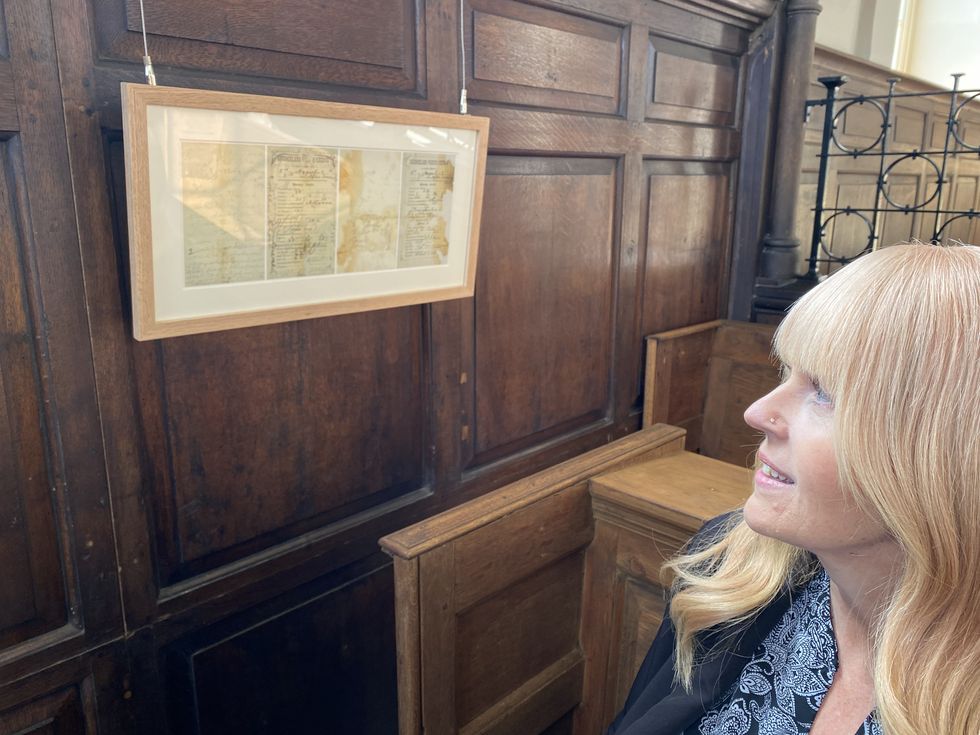Tom Wilkinson
Apr 26, 2022

Undated handout photo issued by Seventeen Nineteen of centre manager Tracey Mienie in the seat where a hidden message from an orphanage choirboy pleading not to be forgotten has been found after it lay undisturbed in a church pew for 125 years. Issue date: Tuesday March 29, 2022.
PA Media - Seventeen Nineteen
A Victorian orphanage choirboy, who hid a letter in a church pew asking not to be forgotten, went on to become a US naval hero, it has been revealed.
Written in 1897 by 13-year-old William Elliott, the note was recently found by workmen renovating Sunderland’s former Holy Trinity Church.
The choirboy, whose time at the nearby Sunderland Orphanage Asylum was drawing to an end, asked the finder to “keep it, in remembrance of me, W Elliott.”
Whoever you are that finds this paper, don’t tear it up or throw it away, keep it in remembrance of me, W. Elliott. I was the leading boy of this choir. I love you if you love me
William Elliott's note
When the letter was found it created headlines around the UK and William’s fate was discovered by researchers who found he had gone on to have a remarkable life serving in with the US Navy in both world wars.
He was born in Sunderland on 29 October 1983 to Thomas Duncan Elliott – a chief officer in the Mercantile Marine, the forerunner of the Merchant Navy – and his wife Sarah Ann.
Disaster struck in 1897 when Thomas, who was sailing on the Skyros merchant vessel, drowned in a storm.
His struggling mother put William in the orphanage when he turned eight, where he would stay for the next six years.
His sad letter said: “Dear friend whoever finds this paper think of William Elliott, who had two months, two weeks and four days on 11 of August 1897.
“Whoever you are that finds this paper, don’t tear it up or throw it away, keep it in remembrance of me, W. Elliott. I was the leading boy of this choir. I love you if you love me.”
Research by Seventeen Nineteen, which operates the church as an event space, revealed that by 1901 William, who had been well-educated at the orphanage, was working as a solicitor’s clerk.
He then followed his sister in emigrating to New York when he was just 19 and enlisted in the US Navy months later.
Thanks to the work of people who were as touched by his story as we were, we know he went on to lead a full, rich life, serving his country and much loved by his family
Tracey Mienie
He started a 42-year career, during which he served in the First World War and later on a variety of Navy vessels before retiring in 1939.
But when the US joined World War Two, William re-enlisted, working as a supply officer, reaching the rank of commander before retiring again after the war.
He was had two children and was married three times – with his first two wives dying before him.
He died aged 84 in a San Diego rest home in 1968 and was buried at Arlington National Cemetery in Washington DC – recognised as his adopted country’s most hallowed ground.
“Ever since we found William’s letter, we have wondered what became of him,” said Tracey Mienie, centre manager at Seventeen Nineteen.
“And now, thanks to the work of people who were as touched by his story as we were, we know he went on to lead a full, rich life, serving his country and much loved by his family.”
Top 100
The Conversation (0)













